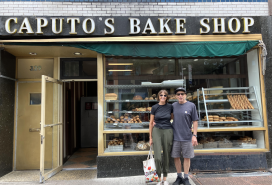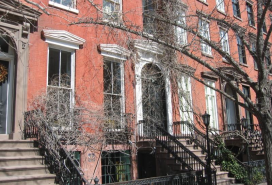Sell
An end to the all-cash craze (sort of), the Uber of apartment-hunting, and more on NYC real estate's future

Yesterday marked the sixth annual NYC Real Estate Expo, which doesn't just mean a hotel packed to the gills with brokers (and a surprisingly high number of exhibitors giving out candy), but also a chance to mine people with firsthand knowledge of the business for ideas on what to expect in the coming year, whether you're looking to buy, rent, or sell. A few tidbits we picked up along the way:
- Cash is king, but within reason. While no one would go so far as to say that the all-cash buying trend is anywhere close to over, it does seem to be calming down, at least a bit. During one panel, Town Residental broker Lyon Porter said, "I don’t think there are as many bags of cash being thrown at deals. There’s more of a conversation where people say, 'If we need to we’ll go all cash, but I might finance part of it.'" Urban Compass President Leonard Steinberg also pointed out that the majority of all-cash buys are in the upper 1 percent of the market, and all things considered, "They represent a very small portion of sales."
- Landlords won't be making more concessions than usual. Though we are heading into the slow season for rentals, William Raveis managing director Kathy Braddock noted that other than the occasional one-month-free offer, "I don't see a lot of landlords doing concessions. While the very expensive, $20,000/month rentals that have come on the market might be slow to find tenants, if you're a typical New Yorker, the rental market is steady and normal." And here, steady and normal translates to "expensive."
- Expect more new developments in the outer boroughs. As Town's Porter pointed out, many buyers—those of us who aren't looking to drop tens of millions on a condo at One57—are moving to Brooklyn and Queens, and developers are taking note, meaning you can definitely expect more new condos cropping up in areas like Bushwick and Crown Heights. As Field put it, more developers are looking to areas they consider "fringe."
- Don’t hold your breath for the “Uber of real estate." The car-service app may have forever changed the way you hail a taxi, but don’t expect a similar revolution for real estate. Given that it takes people weeks, months or even years to settle on a home, and involves a team of professionals (brokers, attorneys, and so on), there probably won’t be a single app or website that’s going to upend the apartment search, even if an array of tech tools are helping ease the process, says Phil Horigan, a broker at the Corcoran Group and founder of Leasebreak, a short-term rental site.
- Think of your broker as a consultant. It’s easier than ever for buyers, sellers and renters to find information online--from video footage of apartment interiors to demographic breakdowns of neighborhoods--that used to be available mainly to brokers. Good brokers can make themselves useful by sifting through the data and helping you decide what’s useful, rather than being a gatekeeper to the info. “The listing is now ubiquitous,” says Eric Gordon, founder of RealPlus, a listing database for brokers. “Everyone has that listing and they no longer need the agent to provide the listing. What they need is the consulting. ‘Is it the right apartment, the right home, for me and my family?’” (An even more useful broker, we would add, would also tell you whether there's anything wrong with the apartment, skillfully negotiate the best deal, and maybe even have a whisper listing up his or her sleeve. )
Related:
An autumn in New York guide to rental concessions
Brick Underground articles occasionally include the expertise of, or information about, advertising partners when relevant to the story. We will never promote an advertiser's product without making the relationship clear to our readers.

























